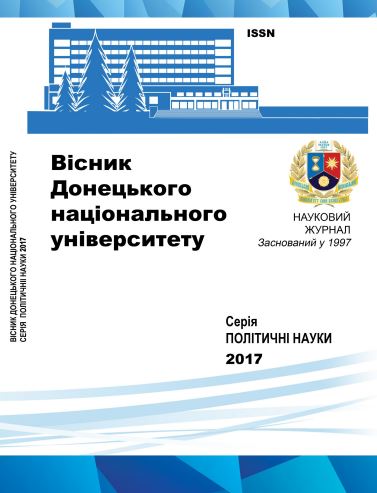Destructive elements of digital content and information services in the perspective of the introduction of i-democracy.
Keywords:
information, information inequality, digital inequality, information lag, digital content, information services, control, access, ICT, information democracyAbstract
The article explores the issues of introducing of i-democracy, which requires modernization, in particular, the system of public administration, effective administrative reform. The imperfection of the procedures for providing and receiving administrative services through the use of ICT, the slowness of information democracy due to the lack of opportunities for everyone through ICT to participate in the formulation and implementation of state and local policies are analyzed; insufficiently effective interaction of executive authorities, local self-government bodies and non-governmental public organizations. Among the destructive elements that slow the introduction of e-democracy, the low level of awareness, motivation and training of civil servants, representatives of non-governmental public organizations, business and population, and the like is called.
References
Mytko A. Prospects and challenges in information democracy / A. Mytko // Radīt nākotni: komunikācija, izglītība, bizness, (Rīga, 2013. gada 30. Maijs). – Rīga: SIA «Biznesa augstskola Turība», 2013. – Р. 25–32.
Городенко Л. М. Цифрова та інформаційна нерівність у мережевій комунікації / Л. М. Городенко // Інформаційне суспільство. – Вип. 16. – 2012. – Липень–грудень. – С. 56–59.
Педак І. С. Інформаційна нерівність у соціальних системах як соціально-політичний чинник / І. С. Педак // Держава та регіони. – 2011. – № 2. – С. 181–185.
Україна на шляху до інформаційного суспільства / В. С. Журавський, М. К. Родіонов, І. Б. Жиляєв; [За заг. ред. М. З. Згуровського]. – К. : ІВЦ «Політехніка», 2004. – 484 с.
Соснін О. В. «Весь мир-Театр», а люди в ньому – інфозомбі / О. В. Соснін // Кореспондент. – 2012. – 12 сент. – Електронний режим доступу до статті: http://blogs.korrespondent.net/users/blog/0674052625/a76653.
Архипова Є. О. Інформаційна нерівність як соціальна проблема сьогодення / Є. О. Архипова // Методологія, теорія та практика соціологічного аналізу сучасного суспільства. – С. 335–339.
Дятлов С. А. Информационное право в системе отношений электронного правительства и институтов гражданского общества / С. А. Дятлов // XI Всероссийская объединенная конференція : [«Интернет и современное общество»]. – 2008. – С. 155–158.
Вартанова Е. Л. Финская модель на рубеже столетий. Информационное общество и СМИ Финляндии в европейской перспективе / Е. Л. Вартанова. – М. : Изд-во МГУ, 1999. – 287 с.
Kroker A. Data Trash: the theory of the virtual class / A. Kroker, M. Weinstein // New World Perspectives. –Montreal, 1994. – 160 p.
Гриценко О. Природа інформаційного суспільства та розвиток світового ринку мас-медіа / О. Гриценко // Вісник Львів. ун-ту. – Серія журн. – 2009. – Вип.32. – С. 214–222.
Смит Б. Общество, основанное на знании: политика Европейского Союза / Б. Смит // Информационное общество. – 2002. – Вып. 1. – С. 8-21.

